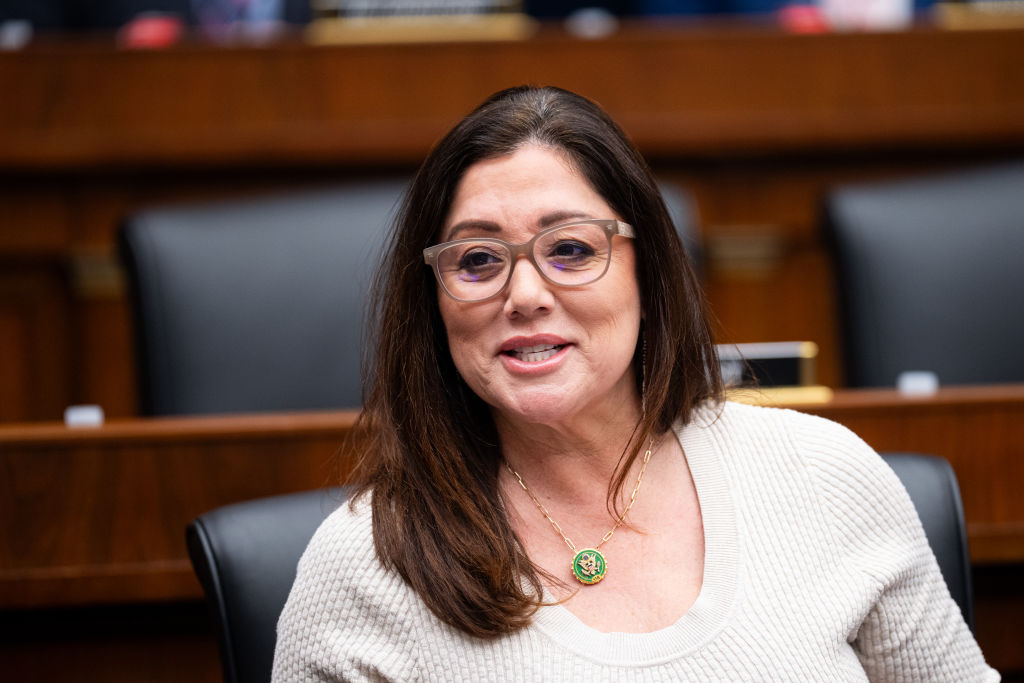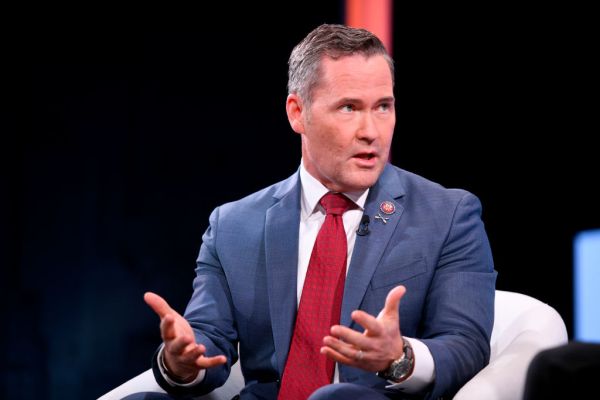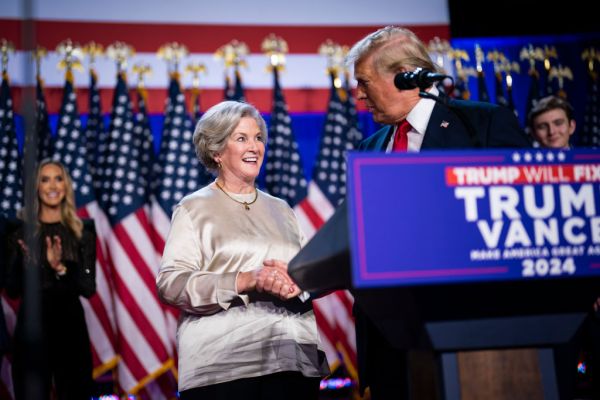The problem with seeking rhyme or reason in Donald Trump’s policies is that not only is he not an ideologue, he’s—ahem—“mercurial.”
He believes in “America First” … yet began his first term as president by bombing Syria and ended up assassinating the head of Iran’s Quds Force.
He’s a populist fighting for the working man … whose biggest domestic accomplishment was a tax-cuts bill that primarily benefited the rich.
He’s a pro-lifer who kept his promise to end Roe v. Wade … and now promises to protect access to abortion in blue states.
In conclusion, Trumpworld is a land of contrasts.
For years, ambitious nationalists have tried to put intellectual meat on the bone of Trumpism in hopes of converting one unstable man’s whims into a proper philosophy of government. It’s a fool’s errand. Trump is a snarl of narcissism, transactionalism, paranoia, and grievance; he has a few strong beliefs—like limiting immigration and tariff-ing everything in sight—but beyond those it’s anyone’s guess what he might do in a second term or which advisers will prevail upon him.
But that’s not very satisfying punditry, is it?
Insightful commentary tries to find order in apparent chaos. In his latest New York Times column, Ross Douthat did his best to systematize the “messy coalition” Trump has assembled for his new Cabinet by offering three theories for why the president-elect chose the nominees he did. Maybe he’s building a Euro-style parliamentary government that includes leaders of allied factions. Or maybe he’s chosen a team of human wrecking balls yearning to demolish their own agencies. Or maybe, as I’m inclined to believe, he prizes a “team of podcasters” who’ll do a lot of talking on television and not much decision-making.
The probable truth is that none of these is correct, though. There’s no specific strategic rationale guiding Trump’s nominations, I suspect, just a tangle of “vibes” that appeal to him as he considers each vacancy. How “loyal” is the candidate? Is he or she broadly anti-establishment in outlook? Has he or she demonstrated unusual contempt for, or ruthlessness toward, political opponents? Is he or she good on television?
Practically every major nominee has been some combination of crony, contrarian, killer, and commentator. (Ironically, the example par excellence is the one who already withdrew.) Even Marco Rubio, one of the least Trumpy of the group, transformed years ago into a dependable MAGA apologist eager to do battle on Sunday morning TV in defense of his patron.
They’re all birds of a feather with slight differences in plumage. But there is an exception.
On Friday, Trump nominated Rep. Lori Chavez-DeRemer of Oregon to be his new labor secretary. Of all his picks, she’s the most unusual—and has received an interesting reception on the right.
‘Slightly different.’
“I guess it shouldn’t be surprising he picked a pro-union labor secretary,” one of my editors said this morning of Chavez-DeRemer’s selection, “but this feels weird in a slightly different way than, say, RFK.”
It does, and no wonder. Chavez-DeRemer isn’t a prominent Trump surrogate who’s raised big bucks for him and slobbered over him in media appearances, as new treasury secretary nominee Scott Bessent has. She isn’t a well-known conspiratorial kook beloved by Trump’s populist base like Robert F. Kennedy Jr. or Tulsi Gabbard is. She’s earned no reputation for ruthlessness of which I’m aware, unlike Matt Gaetz and Pete Hegseth. And I don’t think I’ve ever seen her on television. Insofar as she’s done appearances, they’ve been forgettable in a way that’s uncharacteristic for Trump nominees.
She’s undistinguished as a crony, contrarian, killer, or commentator. What is she doing in this Cabinet?
Chavez-DeRemer is the clearest (and maybe only) example in the bunch of the “parliamentary coalition” theory Douthat described. Her most notable action since joining Congress last year was supporting the Protecting the Right to Organize (PRO) Act, a pro-union bill that would have expanded collective bargaining rights and undercut red states’ right-to-work laws. Nominating her is plainly Trump’s attempt to consolidate the electoral gains he’s made with union members by placing a labor-friendly Republican atop the Labor Department. Populist righties wanted a party of the working man and now, by God, they’ve got it.
That’s one thing that makes her nomination “weird.” There really is strategic logic to it. It’s not just a matter of Trump grooving on the nominee’s obsequiousness and retributionist “vibes.”
But the other thing that makes the pick weird is how mortified many conservatives have been by it.
It makes sense that Senate Republicans like Bill Cassidy would look askance at Chavez-DeRemer, as Congress still has a healthy number of legislators who were weaned on Reaganism. But I was surprised by how much backlash there was online Friday night as news of her nomination circulated. Since 2015 the Trumpist project has sought to uninstall movement conservatism as the “software” for Republican politics—and that project is almost complete. The GOP as an institution no longer prioritizes small government, containing rival foreign powers, restricting the number of abortions performed in America, or even basic decency or competence in its leadership.
There’s hardly any Reaganism left … except when it comes to having a pro-union labor secretary, apparently, which seems to cross some atavistic Buckleyite red line. Weird, as my editor said. And even weirder is the fact that Trump’s electoral performance among union members has gotten plenty of media hype, which you might think would earn him the benefit of the doubt on this nomination among partisan conservatives who are ecstatic about his victory.
Why is Lori Chavez-DeRemer a bridge too far for lapsed Reaganites when massive deficits, rethinking U.S. alliances, and backing away from national abortion restrictions haven’t been? I think the answer has less to do with ideology than with tribalism, as virtually everything in modern right-wing politics does.
Forced labor.
There is some ideological mooring here. It’s worth remembering that two of the biggest star turns in Obama-era Republican politics came at the expense of organized labor. Chris Christie became a right-wing media sensation by battling New Jersey’s teachers unions, and Scott Walker scored a major legislative victory over intense Democratic opposition by reforming collective bargaining in Wisconsin.
But a lot of conservative ideological mooring has come unmoored under Trump. Why hasn’t right-wing opinion about unions done so as well?
One reason, I assume, is the role teachers unions played in lobbying to keep schools closed during the pandemic after it became clear that children had little to fear from COVID. Despite politicians bending over backward to prioritize teachers’ safety, from ushering them toward the front of the line for vaccines to appropriating nearly $200 billion for public education to address COVID-related problems, unions encouraged friendly Democratic politicians to extend closures well into 2021. Parents’ outrage at the learning loss their children suffered may have helped reelect Trump; his nominees to fill the public health positions in his Cabinet are all “COVID contrarians,” coincidentally enough.
The human face of union opposition to reopening schools was Randi Weingarten, head of the American Federation of Teachers. She’s become a top-tier political villain in Republican politics because of it—yet there she was on Friday night cheering Donald Trump’s nominee to lead the Labor Department. “It is significant that the Pres-elect nominated Rep. Chavez-DeRemer for Labor,” she tweeted. “Her record suggests real support of workers & their right to unionize. I hope it means the Trump admin will actually respect collective bargaining and workers’ voices from Teamsters to teachers.”
The implied warranty in Trump’s Us-and-Them brand of politics is that he’ll use public power to ruthlessly punish the right’s cultural enemies. That Weingarten, the dictionary definition of a tribal enemy, should be gratified by his choice on labor policy feels like a grievous breach of that warranty.
There’s another reason why Chavez-DeRemer might be hard for partisan conservatives to swallow, though. Compared with issues like government spending and foreign interventions, there’s been little ideological work done by populists to “uninstall” the Reaganite conventional wisdom on unions.
Consider: Trump began signaling as early as 2016 that he’s reluctant to reform entitlements (although he does pay lip service to the idea occasionally) and ran enormous deficits as president even before COVID arrived. From his early days as a presidential candidate he made clear that he doesn’t view traditional U.S. allies and enemies the way Reaganites do and proved the point by holding an infamous summit with Vladimir Putin in Helsinki in 2018. His Republican fans have been marinating in all of that anti-conservative contrarianism daily for nearly 10 years, regularly amplified by talented demagogues in the media they like to consume.
Inevitably, little by little, they’ve been conditioned not to care about fiscal responsibility or about defending the international liberal order from authoritarians. Ditto for formerly outré beliefs like anti-vaxxism and curing economic ills with tariffs: A lot of political energy has been spent over the last few years smuggling those ideas into mainstream right-wing thought. But comparatively little has been devoted to presenting organized labor as beneficial to the economy or useful to the working joes who voted for Trump on November 5.
That means unions are still “Democrat-coded.” The old Reaganite software on that topic is still running.
In fact, while partisan conservatives are doubtless grateful for the support of union members in defeating Kamala Harris, they may have assumed that the political alliance the two groups have formed was a purely cultural one. Trump owes blue-collar Democrats who supported him this year the same thing he owes Republicans, Reaganites might have imagined—a war on crime, illegal immigration, and all things “woke.” That he might also feel obliged to meet them halfway (or more than halfway) on actual labor issues may not have occurred to many.
It’s one thing for them to watch their tribe of Republicans be turned inside out ideologically, with yesterday’s “constitutional conservatives” devolving into power-worshipping authoritarians today. It’s quite another for them to find themselves in a new coalition with members of the other tribe and Trump seemingly converting to those members’ beliefs rather than insisting that they convert to his.
Why, it’s enough to make someone wonder who the “Us” and who the “Them” really is.
What’s ‘conservative’?
Responding to Douthat on Sunday, Jonah Goldberg said that he largely agreed that movement conservatives are now just one faction among several in the Republican Party’s new coalition. “But what is annoying,” he went on to say, “is the least conservative elements of this coalition are the most determined to insist that any criticism of, or deviation from, the popular front party line are not conservative.”
Is that true? I’m asking earnestly.
In my experience the word “conservative” is used less often nowadays to describe the components of Trump’s party, even the elements of it that have traditionally used that term in describing themselves. “Social conservatives” increasingly are “evangelicals” or just “Christians”; “fiscal conservatives” are a functionally extinct species and don’t have a name at all. The closest thing, I suppose, is Elon Musk’s dopey half-commission, half-meme DOGE.
Trump himself rarely talks about “conservatism,” of course, and was way ahead of the curve in separating it conceptually from the Republican Party he hoped to build.
But I think I know what Jonah means. Never Trumpers are often mocked by the right for justifying their support for Democrats on “conservative” grounds, never mind the arguments on the policy merits. If the GOP is now amorphous enough ideologically to include organized labor, Jonah might say, the least its fanboys can do in attacking those of us who want no part of it is to stop concern-trolling us about the fate of a “conservatism” for which they don’t care a whit.
That too is ultimately explained by tribalism, though. Populists who scold others for betraying “conservatism” by criticizing Trump are reaching for the most useful weapon at hand with which to bludgeon a right-wing opponent. After eight years, you’re not going to shame Jonah Goldberg or me by accusing us of being traitors to Trump or to MAGA nationalism. We don’t care. We’re not on those teams. But we are on Team Conservative, and so if you’re looking to wound us by accusing us of having failed our tribe somehow, that’s the way to go.
“Conservative” has become an empty byword for tribal authenticity, in other words, as the GOP becomes less conservative in substance. Nothing would be more absurd or more predictable than MAGA fanatics hammering Senate Republicans for being “unconservative” by opposing Lori Chavez-DeRemer—except, I suppose, Senate Democrats then turning around and helping her get confirmed by voting for her en masse.
Republicans might confirm her without their help, though. A leader like Trump who’s capable of persuading millions of Reaganites to embrace absurdly profligate spending and isolationism can surely persuade them to love unions as well. Having already gotten his base to back a pro-choicer, a former George Soros adviser, and a Bashar Assad apologist for his Cabinet, getting them to back a crony of Big Labor should be a piece of cake.










Please note that we at The Dispatch hold ourselves, our work, and our commenters to a higher standard than other places on the internet. We welcome comments that foster genuine debate or discussion—including comments critical of us or our work—but responses that include ad hominem attacks on fellow Dispatch members or are intended to stoke fear and anger may be moderated.
With your membership, you only have the ability to comment on The Morning Dispatch articles. Consider upgrading to join the conversation everywhere.